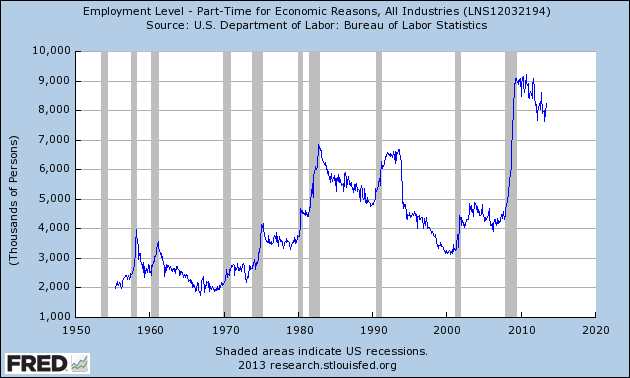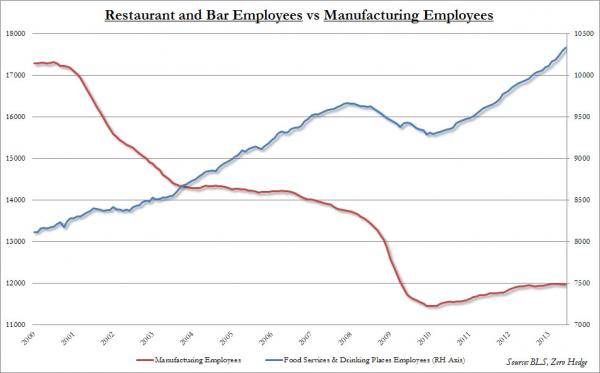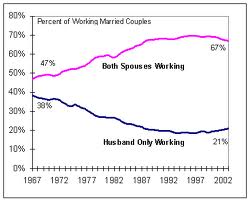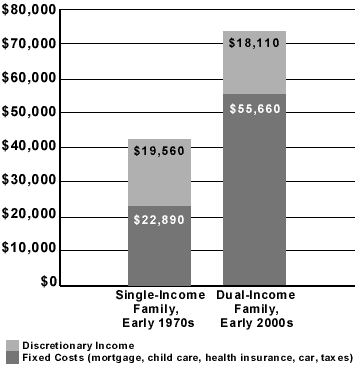Part-time nation: What does it say when a vast portion of our society is now working at part-time jobs? 2013 scorecard: Minimum wage restaurant jobs added: 239,000. Manufacturing jobs added: 13,000.
- 3 Comment
One of the more troubling pieces of economic data I have seen is that excluding restaurant and bar employment, we are actually down nearly 2 million jobs in the private industry going back to the start of this long drawn out recession. This is probably one of the narrowest recoveries in our nation’s history focused on a small portion of our population. The trend towards being a part-time nation is part of the low wage predatory capitalist system we are living in. Chart after chart shows how most of the economic gains over the last few decades have gone to a very small group of people. Even on sites like Fiverr, you have talented people all around the world putting out quality work for something like $5 per project. How is it feasible for someone to make a living off of something like this? There was also a major legal case regarding how some companies exploit “internships†for essentially slave labor. With the middle class shrinking can we survive as a nation with the bulk of our employment gains coming from temporary and low paid jobs?
Part-time employment
While we are told that we’ve been in recovery since the summer of 2009 (4 full years ago) those working part-time for economic reasons seem to be wondering what kind of recovery this truly is:
This trend never reversed. This is all happening while the US stock markets are making record highs. But we are also making record highs in food stamp usage so breaking records does not always mean a good thing.
One of the more shocking charts is one looking at food employment versus manufacturing:
Source:Â ZeroHedge
This isn’t a positive trend but does help to explain why working and middle class Americans do not feel this as a full recovery. The numbers are more humbling when broken out:
Net added jobs (2013):
Minimum wage restaurant and bar employment:Â Â Â Â Â Â Â Â Â Â Â Â 239,000
Manufacturing jobs:Â Â Â Â Â Â Â Â Â Â Â Â Â Â Â Â Â Â Â Â Â Â Â Â Â Â Â Â Â Â Â Â Â Â Â Â Â Â Â Â Â Â Â Â Â Â Â Â Â Â Â Â Â Â Â Â Â Â Â Â Â Â Â Â Â Â Â Â Â Â 13,000Â Â
This is why when we discuss that the average per capita wage in the US is $26,000 the data is not so startling. Some people seem to think it is but they are brainwashed on the sanitized media that seems to purposely ignore any solid economic analysis in favor of mind cleansing the public with reality TV shows and quick marketing blitzes that stunt your psychological awareness of bigger things.
The two-income trap
So this all ties in to the two income trap many households are living through. It is great news that more and more people are working together yet hidden behind the bliss, is pure financial necessity:
When we adjust for inflation, even with two incomes, we see that much more money is tied up in items like housing, college tuition, healthcare, and food:
But what do you expect when working and middle class Americans are being thrown to the financial wolves? So it should be no surprise that we are becoming a part-time nation. This is simply a function of a low wage capitalist system that socializes losses for the financially connected and spreads the economic pain of austerity on those at the lower rungs. This isn’t a free market. This is a controlled bailout specifically targeting the established class. Even the Fed’s QE is directly helping large investors purchase real estate at fire-sale prices leveraged with low rates. Those low rates come at the expense of regular savers earning 0 percent in bank accounts. The money is made on the margin. Yet most of the public is locked out of this game.
So we’ll continue adding part-time jobs and calling this a full economic recovery. We became a major financial powerhouse because of a strong middle class, not in spite of it. And a strong middle class relies on quality jobs and a diverse employment recovery.
If you enjoyed this post click here to subscribe to a complete feed and stay up to date with today’s challenging market!3 Comments on this post
Trackbacks
-
JB said:
What else did you expect to happen when politicians saw globalization as a tool of power and money. It opened the world to cheaper foreign labor to produce what everyone wanted but at what cost? The cost is a lowering standard of living for the workers who now can’t compete and are forced to take lower wages to produce goods that can match competing products. Don’t blame the employers that are exploiting the workers. They either compete or go out of business and then there are no jobs. Then add in a socialist US President whose unworkable universal health care plan is driving business to cut back to part-time labor in an effort to survive and you have what’s left of the USA. Also, add in an increasing number of people who will vote for any politician that will promise them more government benefits. Welcome to the third world everyone……….
July 18th, 2013 at 5:35 am -
Lynn Dowless said:
I have no problem with corporations having the freedom to relocate off shore to maximize their profit margin. All that I ask is for the individual people to have the freedom to engage in unfettered enterprise, accumulate wealth producing resources, and keep the fruits of their labor for their own benefit in exchange for corporations exercising their freedom abroad. This means individuals possessing the unlimited freedom to produce and trade among themselves as well. That exchange is fair enough, is it not? You failed us, Washington!
July 19th, 2013 at 10:36 am -
Jakob Stagg said:
No problem. Since working two part time jobs will not allow a person to make a living, the government can’t print food stamps fast enough. It is the NEW recovery.
July 28th, 2013 at 9:32 am




 If you enjoyed this post click here to subscribe to a complete feed and stay up to date with today’s challenging market!
If you enjoyed this post click here to subscribe to a complete feed and stay up to date with today’s challenging market!